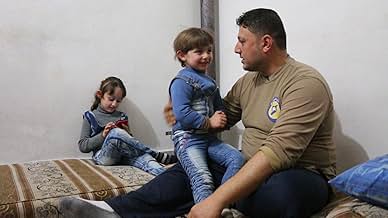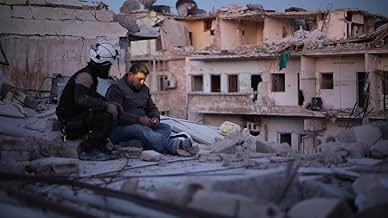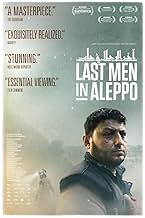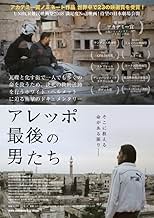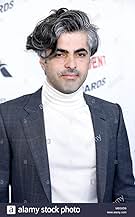IMDb-BEWERTUNG
7,4/10
3075
IHRE BEWERTUNG
Khaled, Mahmoud und Subhi haben sich freiwillig bei den Weißhelmen gemeldet, um das Leben hunderter Opfer im belagerten Aleppo während des syrischen Bürgerkriegs zu retten.Khaled, Mahmoud und Subhi haben sich freiwillig bei den Weißhelmen gemeldet, um das Leben hunderter Opfer im belagerten Aleppo während des syrischen Bürgerkriegs zu retten.Khaled, Mahmoud und Subhi haben sich freiwillig bei den Weißhelmen gemeldet, um das Leben hunderter Opfer im belagerten Aleppo während des syrischen Bürgerkriegs zu retten.
- Regie
- Drehbuch
- Hauptbesetzung
- Für 1 Oscar nominiert
- 26 Gewinne & 17 Nominierungen insgesamt
Mahmoud Alheter
- Self - volunteer rescue worker
- (as Mahmoud)
Empfohlene Bewertungen
This is not your usual documentary film with resource persons/interviewees and a host or narrator. It's told from a first-person point of view. The actors are the subjects playing as themselves in real time as events unfold.
It captures vividly the stark realities of war that the victims will never forget as long as they live. The wanton destruction is stupefying. And the live video shots make sure that we'll remember the ugliness of war.
The viewer is a witness to the brave, heroic efforts of the White Helmets. The viewer watches them go about their grim business of clearing the rubble caused by barrel bombs, retrieving dead bodies of their fellow holdouts, gathering torn limbs and other body parts. Yet in between the bombings, the people try as much to live a normal life: attending the wedding of a colleague, building an aquarium for pet fish out of an unused water fountain, playing with their kids in the playground while on the lookout for war planes above.
The viewer isn't surprised by the ending. On the contrary, he seems to expect it given that the White Helmets know exactly what they're up against. Still, Batoul's phone messages to his father Khaled Omar Harrah are heart-rending.
The documentary owes its existence to Mahmoud and Khaled but most specially to Khaled.
It captures vividly the stark realities of war that the victims will never forget as long as they live. The wanton destruction is stupefying. And the live video shots make sure that we'll remember the ugliness of war.
The viewer is a witness to the brave, heroic efforts of the White Helmets. The viewer watches them go about their grim business of clearing the rubble caused by barrel bombs, retrieving dead bodies of their fellow holdouts, gathering torn limbs and other body parts. Yet in between the bombings, the people try as much to live a normal life: attending the wedding of a colleague, building an aquarium for pet fish out of an unused water fountain, playing with their kids in the playground while on the lookout for war planes above.
The viewer isn't surprised by the ending. On the contrary, he seems to expect it given that the White Helmets know exactly what they're up against. Still, Batoul's phone messages to his father Khaled Omar Harrah are heart-rending.
The documentary owes its existence to Mahmoud and Khaled but most specially to Khaled.
10 stars for the bravery of the innocent children and men who risked there lives
Assad and putin prove there is no god . Just mass murderers who live in opulence as they slaughter children.
Assad and putin prove there is no god . Just mass murderers who live in opulence as they slaughter children.
Tough movie to watch. Tougher to read the reviews of dumb conspiracy theorists who think George Soros can cause solar eclipses and the such. It's actually a remarkably unpolitical film, but follows the day by day lives of firemen in Aleppo. It's pretty tragic, but the humanity of the people in Syria shine through.
"Last Men in Aleppo", is a shattering Danish/Syrian documentary about the Syrian Civil War that should leave you in anger and tears after viewing it.
Beginning as a film editor, Syrian writer/director Firas Fayvad previously had made documentaries for television, his most famous being "On the Other Side", the making of which resulted in Fayyad's arrest and torture for nine months between 2011 and 2012. But even that has not achieved the level of international fame "Last Men in Aleppo" has brought him, for it documents the efforts of the White Helmets, an organization consisting of ordinary citizens whose purpose is to save civilians (especially children) who are buried under the rubble from continuous bombings by the Soviet Union unabashedly targeting apartment buildings, hospitals and non-military establishments.
What is so shocking about this film is the way it plants the viewer in the middle of the violence as it is happening, and from the point of view of the heroic rescuers. There are deliberate lulls in the film in which we live in the houses with the families of the White Helmets, but that just makes the inhuman tragedy even more shocking when the violence comes. This is a film impossible to forget once seen.
Beginning as a film editor, Syrian writer/director Firas Fayvad previously had made documentaries for television, his most famous being "On the Other Side", the making of which resulted in Fayyad's arrest and torture for nine months between 2011 and 2012. But even that has not achieved the level of international fame "Last Men in Aleppo" has brought him, for it documents the efforts of the White Helmets, an organization consisting of ordinary citizens whose purpose is to save civilians (especially children) who are buried under the rubble from continuous bombings by the Soviet Union unabashedly targeting apartment buildings, hospitals and non-military establishments.
What is so shocking about this film is the way it plants the viewer in the middle of the violence as it is happening, and from the point of view of the heroic rescuers. There are deliberate lulls in the film in which we live in the houses with the families of the White Helmets, but that just makes the inhuman tragedy even more shocking when the violence comes. This is a film impossible to forget once seen.
"There is nothing intelligent to say about a massacre. Everybody is supposed to be dead, to never say anything or want anything ever again. Everything is supposed to be very quiet after a massacre, and it always is, except for the birds. And what do the birds say? All there is to say about a massacre, things like 'Poo-tee-weet?'" Kurt Vonnegut, Slaughterhouse-Five
Call it what you will, Syria's President Assad's pummeling his people with the aid of Russian bombers is genocide plain and simple. You do not want to see the blunt documentary Last Men in Aleppo if you support Assad or can't stomach The White Helmets pulling dead babies from rubble.
What you will see, however, is a first-rate rendering from the streets of Helmet heroic citizens risking their lives to save the victims of the destruction. The doc concentrates on Khaled Omar, a founder of the Helmets, looking for people to save all the time staying in contact through cell with his family. On occasion he plays with the kids at an oasis of a playground.
Therein lies the supreme irony of people trying to survive holocaust and trying to retain the dignities of normal life. As one Helmet says, "Should we sit down and cry or what?" Actually only the words of the survivors can get even close to understanding genocide in our own time, 250,000 Syrians dead since the purge began in 2011.
Although Khaled and his crew save adults as well, the children are the starkest notion of cruelty on a mass basis and the loss of future for everyone, as Khaled says profoundly and prophetically, "The dilemma is the children." Despite the discursive narration and exposition that seem to randomly course among the ruins, the cumulative effect of sorrow and brief joy is to give us an unforgettable documentary experience, even if we go back to our democratic safety zones, creating a few potholes on an airstrip while the city burns.
"The horror! The horror!" Joseph Conrad's Kurtz in Heart of Darkness
Call it what you will, Syria's President Assad's pummeling his people with the aid of Russian bombers is genocide plain and simple. You do not want to see the blunt documentary Last Men in Aleppo if you support Assad or can't stomach The White Helmets pulling dead babies from rubble.
What you will see, however, is a first-rate rendering from the streets of Helmet heroic citizens risking their lives to save the victims of the destruction. The doc concentrates on Khaled Omar, a founder of the Helmets, looking for people to save all the time staying in contact through cell with his family. On occasion he plays with the kids at an oasis of a playground.
Therein lies the supreme irony of people trying to survive holocaust and trying to retain the dignities of normal life. As one Helmet says, "Should we sit down and cry or what?" Actually only the words of the survivors can get even close to understanding genocide in our own time, 250,000 Syrians dead since the purge began in 2011.
Although Khaled and his crew save adults as well, the children are the starkest notion of cruelty on a mass basis and the loss of future for everyone, as Khaled says profoundly and prophetically, "The dilemma is the children." Despite the discursive narration and exposition that seem to randomly course among the ruins, the cumulative effect of sorrow and brief joy is to give us an unforgettable documentary experience, even if we go back to our democratic safety zones, creating a few potholes on an airstrip while the city burns.
"The horror! The horror!" Joseph Conrad's Kurtz in Heart of Darkness
Wusstest du schon
- WissenswertesAlle Einträge enthalten Spoiler
- VerbindungenFeatured in Die 90. Oscar-Verleihung (2018)
Top-Auswahl
Melde dich zum Bewerten an und greife auf die Watchlist für personalisierte Empfehlungen zu.
Details
- Erscheinungsdatum
- Herkunftsländer
- Offizieller Standort
- Sprache
- Auch bekannt als
- Last Men in Aleppo
- Drehorte
- Aleppo, Syria(location)
- Produktionsfirmen
- Weitere beteiligte Unternehmen bei IMDbPro anzeigen
Box Office
- Bruttoertrag in den USA und Kanada
- 14.637 $
- Eröffnungswochenende in den USA und in Kanada
- 1.505 $
- 7. Mai 2017
- Weltweiter Bruttoertrag
- 14.637 $
Zu dieser Seite beitragen
Bearbeitung vorschlagen oder fehlenden Inhalt hinzufügen


